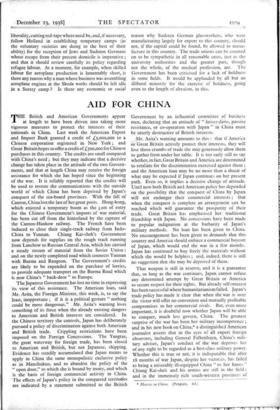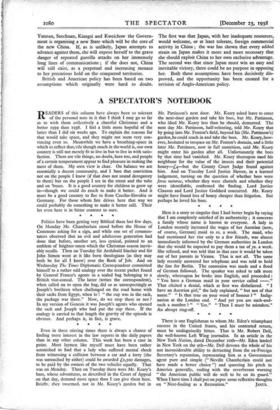AID FOR CHINA
THE British and American Governments appear at length to have been driven into taking more vigorous measures to protect the interests of their nationals in China. Last week the American Export and Iinport Bank granted a credit of £5,000,000 to a Chinese corporation registered in New York ; and Great Britain hopes to offer a credit of £Soo,000 for Chinese purchases in this country. The credits are small compared with China's need ; but they may indicate that a decisive change has taken place in the attitude of the two Govern- ments, and that at length China may receive the foreign assistance for which she has hoped since the beginning of the war. It is reliably reported that the credits will be used to restore the communications with the outside world of which China has been deprived by Japan's conquest of the sea-board provinces. With the fall of Canton, China lost the last of her great ports. Hong-kong, which enjoyed a temporary boom as the tort of entry for the Chinese Government's imports of war material, has been cut off from the hinterland by the capture of the Canton-Hankow railway. The French have been induced to close their single-track railway from Indo- China to Yunnan. Chiang Kai-shek's Government now depends for supplies on the rough track running from Lanchow to Russian Central Asia, which has carried a steady stream of material from the Soviet Union ; and on the newly completed road which connects Yunnan with Burma and Rangoon. The Government's credits are likely to be expended on the purchase of lorries, to provide adequate transport on the Burma Road which is now China's " back-door " to Europe.
The Japanese Government has lost no time in expressing its view of this assistance. The American loan, said Mr. Arita, the Foreign Minister, this week, is, to say the least, inopportune ; if it is a political gesture " nothing could be more dangerous." Mr. Arita's warning loses something of its force when the already existing dangers to American and British interests are considered. In the Chinese territory she controls, Japan has deliberately pursued a policy of discrimination against both American and British trade. Crippling restrictions have been imposed on the Foreign Concessions. The Yangtze, the great waterway for foreign trade, has been closed to American and British, but not Japanese, shipping. Evidence has steadily accumulated that Japan means to apply in China the same monopolistic exclusive policy as in Manchukuo, and to abandon the policy of the " open door," to which she is bound by treaty, and which is the basis of foreign commercial activity in China. The effects of Japan's policy in the conquered territories are indicated by a statement submitted to the British Government by an influential committee of business men, declaring that an attitude of " laissez-faire, passive resistance, or co-operation with Japan " in China must be utterly destructive of British interests.
Mr. Arita's warning amounts to this : that if America or Great Britain actively protect their interests, they will lose those crumbs of trade she may generously allow them to gather from under her table. It is too early still to say whether, in fact, Great Britain and America are determined to retaliate for the discrimination exercised against them ; and the American loan may be no more than a threat of what may be expected if Japan continues on her present path. Even so, it implies a decisive change of attitude. Until now both British and American policy has depended on the possibility that the conquest of China by Japan will not endanger their commercial interests ; that when the conquest is complete an arrangement can be reached which will guarantee the prosperity of their trade. Great Britain has emphasised her traditional friendship with Japan. No concessions have been made to popular indignation at the barbarity of Japan's military methods. No loan has been given to China. No encouragement has been given to demands that this country and America should enforce a commercial boycott of Japan, which would end the war in a few months. Japan has continued to buy freely the materials without which she would be helpless ; and, indeed, there is still no suggestion that she may be deprived of them.
That weapon is still in reserve, and it is a guarantee that, so long as the war continues, Japan cannot refuse any determined attempt by Great Britain or America to secure respect for their rights. But already self-interest has been successful where humanitarianism failed. Japan's trade policy has made it clear that when the war is over the victor will offer no convenient and mutually profitable compromises to her commercial rivals. But, even more important, it is doubtful now whether Japan will be able to conquer, much less govern, China. The greatest surprise of the war has been her military incompetence ; and in his new book on China,* a distinguished American journalist asserts that in the eyes of all expert foreign observers, including General Falkenhayn, China's mili- tary adviser, Japan's conduct of the war deprives her of any right to be regarded as a first-class military power. Whether this is true or not, it is indisputable that after i8 months of war Japan, despite her victories, has failed to bring a miserably ill-equipped China " to her knees." Chiang Kai-shek and his armies are still in the field ; and in the immensely rich south-western provinces of
• Mowrer in China. (Penguin. 6d.)
Yunnan, Szechuan, Kiangsi and Kweichow the Govern- ment is organising a new State which will be the core of the new China. If, as is unlikely, Japan attempts to advance against them, she will expose herself to the grave danger of repeated guerilla attacks on her immensely long lines of communications ; if she does not, China will still exist, as a perpetual and increasing menace to her precarious hold on the conquered territories.
British and American policy has been based on two assumptions which originally were hard to doubt. The first was that Japan, with her inadequate resources, would welcome, or at least tolerate, foreign commercial activity in China ; the war has shown that every added strain on Japan makes it more and more necessary that she should exploit China to her own exclusive advantage. The second was that since Japan must win an easy and inevitable victory, there could be no purpose in opposing her. Both these assumptions have been decisively dis- proved, and the opportunity has been created for a revision of Anglo-American policy.



































 Previous page
Previous page